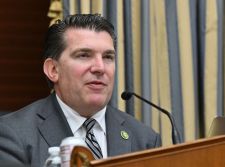House lawmakers optimistic about NAIRR legislation prospects as pilot moves forward

Legislative efforts to codify the National AI Research Resource, or NAIRR, that will help provide researchers with the computational tools needed for researching the technology might have a path forward in 2024, House lawmakers forecasted.
“I think the prospects for the legislation are, I would say, very good to excellent,” Rep. Anna Eshoo, D-Calif., lead sponsor of the legislation, told FedScoop on Tuesday outside a hearing exploring federal science agencies’ use of AI for research. “We want to get this done this year.”
Eshoo, isn’t currently a member of the House Committee on Science, Space and Technology, but was able to participate Tuesday in a joint hearing of its energy and research and technology subcommittees. Eshoo said she anticipates a markup of the legislation in “hopefully in March.”
Similarly, Rep. Jay Obernolte, R-Calif., who is a co-sponsor of the House legislation, told FedScoop outside the same hearing that the legislation is a priority.
“When I look at the landscape of potential AI legislation that should pass this year, I think the CREATE AI Act is right at the top of that list, and so I’m cautiously optimistic that we’ll see some traction,” Obernolte said.
A spokesperson for the full committee didn’t immediately respond to a request for comment on timing for a markup.
While the National Science Foundation recently launched a pilot for the NAIRR to inform the creation of the full-scale resource, the bipartisan and bicameral bill — called the CREATE AI Act — would enshrine it in federal statute.
Eshoo said she welcomed the pilot launch and was “eager to see what comes out of it,” but also noted that “the full force of it is through the legislation.”
The idea behind the NAIRR is to provide researchers with the resources needed to carry out their work on AI, including advanced computing, data, software, and AI models. The pilot, which was a requirement in President Joe Biden’s AI executive order, is supported with contributions from 11 federal agencies and 25 private sector partners.
Evolution, metrics for success
The NAIRR was a central topic of discussion at the Tuesday hearing, which featured witnesses from NSF, Oak Ridge National Laboratory, Georgia Tech, Oakland University, and Anthropic. Lawmakers’ questions indicated interest in the pilot and capabilities of the full-scale resource.
Rep. Frank Lucas, R-Okla., chairman of the full committee, for example, probed panelists about how the resource could keep up “with the rapidly evolving industry standards for advanced computational power.”
Jack Clark, co-founder and head of policy at Anthropic, which has been supportive of the legislation, said making sure researchers can do ambitious research will be key.
“They should not be able to run into a situation where they’re unable to do their research due to running into computational limits,” Clark said. “And how you achieve that in a fiscally responsible way is to make sure that the NAIRR is allocating a portion of its resources for a small number of big-ticket projects each year and adopt a consortium approach for picking what those are.”
Meanwhile, Rep. Scott Franklin, R-Fla., asked about what metrics Congress should be watching for to evaluate success of the pilot as they weigh the estimated $2.6 billion the full resource would require.
In response, Tess deBlanc Knowles, NSF’s special assistant to the director for artificial intelligence, pointed to the number of users the pilot will serve, whether it reaches communities that don’t typically have access to the resources, how many students it can train, and the impact of the resources on projects “in terms of access to computational data resources that they are able to access through the pilot.”
DeBlanc Knowles also noted that experimenting with types of resources and modes of accessing them in the pilot will help the agency “design and scope the plan for the full-scale NAIRR.”






